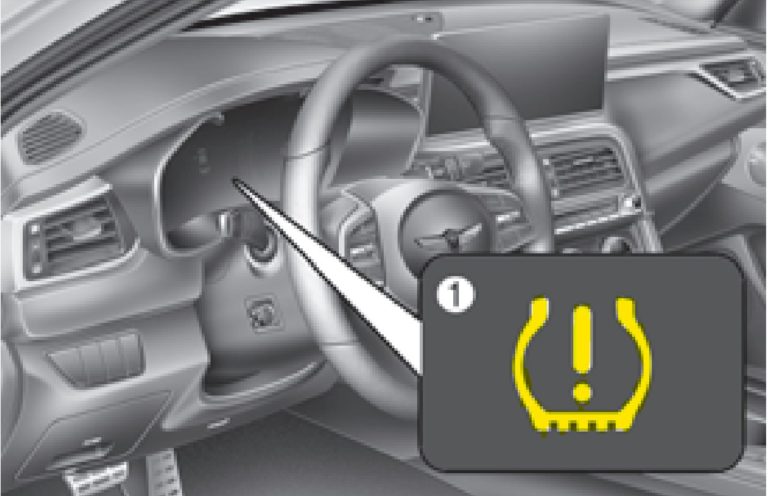Steps to Reset Genesis G70 TPMS
Step 1: Check and Adjust the Tire Pressure
The Genesis G70 does not have a tire pressure reset button. So, the first thing you need to do to turn the tire light off is to set all 4 of your tires to the correct pressures. You can either check the inside of the driver side door-jamb sticker, check out the chart below or select the Mode button on your steering wheel and then scroll down to get to the tire pressure display. Set all 4 tires to the EXACT right pressure. Remember to only adjust your tire pressure when the tires are cold. This means before driving long distances or after the car has been parked for a few hours.
Step 2: Drive Your Genesis G70
After adjusting your tire pressures to the cold recommended pressure, drive the car. You need to drive the G70 for a few minutes at speeds above 20 Mph. You may see a “drive to display” message. After driving the vehicle, the tire pressure light will go off. If it doesn’t go off right away, just keep driving.
Step 3: Re-Check Your Tire Pressure
If the tire pressure light doesn’t go off after step 1 and step 2, recheck your tire pressure. Make sure that the pressure is still at the exact pressure you set it to. If it’s not, you likely have a tire or valve stem leak or some sort of puncture. If the tire light goes off after filling your tires and then comes back on, you definitely have a tire leak. If your tire pressure light is blinking or flashing and then stays on you have a malfunctioning tire pressure system.
2023 Genesis G70 Tire Pressure
Match your tire size in the chart below with the front and rear tire pressures.
ENGINE | TIRE SIZE | POSITION | INFLATION PSI |
2.0L T-GDI | 225/45R18 | Front | 36 |
2.0L T-GDI | 225/45R18 | Rear | 39 |
2.0L T-GDI | 225/40R19 | Front | 36 |
2.0L T-GDI | 225/35R19 | Rear | 36 |
2.0L T-GDI | 225/40ZR19 | Front | 36 |
2.0L T-GDI | 255/35ZR19 | Rear | 36 |
3.3L T-GDI | 225/45R18 | Front | 36 |
3.3L T-GDI | 225/45R18 | Rear | 39 |
3.3L T-GDI (2WD) | 225/40R19 | Front | 36 |
3.3L T-GDI (2WD) | 225/35R19 | Rear | 36 |
3.3L T-GDI (2WD) | 225/40ZR19 | Front | 36 |
3.3L T-GDI (2WD) | 255/35ZR19 | Rear | 36 |
3.3L T-GDI (AWD) | 225/40R19 | Front | 38 |
Genesis G70 TPMS Malfunction Indicator
The Genesis G70’s tire pressure monitoring system (TPMS) has a built-in malfunction indicator. The malfunction indicator uses the same yellow exclamation point tire warning light. When the TPMS encounters a problem, the warning light (yellow exclamation point) will flash for about a minute and then stay lit. This flashing pattern will repeat every time you start your car until the issue is resolved. It’s important to note that while the indicator is on, the TPMS may not function properly, meaning your tire pressure monitoring system won’t work as intended until the TPMS problem is fixed. So, this means if your tire pressure light is blinking, it’s indicative of a problem with the TPMS itself rather than an actual air pressure issue. Usually a faulty pressure sensor in one of your tires. To pinpoint which tire sensor is causing the problem, you’ll need a TPMS diagnostic tool, like the Autel TPMS tool. (We’ve been using Autel TPMS diagnostic tools for a few years and I cannot say enough good things about them)
Always Reset TPMS in These Cases:
After inflating or deflating tires to the recommended pressure
Following tire rotation or tire replacement. (Be sure to note that many Genesis G70’s have staggered wheels and tires. Meaning different sized tires in the front and rear. If your G70 has staggered tires, do not rotate your tires from to back)
When a TPMS sensor is replaced or serviced
After installing a new wheel or tire size
When the vehicle’s battery is disconnected or replaced
If the TPMS malfunction indicator is triggered
Seasonal changes that may affect tire pressure due to temperature fluctuations
How the Genesis G70 TPMS Works
The tire pressure monitoring system (TPMS) in the Genesis G70 is an advanced safety feature designed to help drivers maintain proper tire pressure, which can improve fuel efficiency, prolong tire life, and enhance vehicle handling and performance. Here’s a more detailed breakdown of how the TPMS works in your Genesis G70:
Individual tire pressure sensors: Each tire is equipped with a pressure sensor that is mounted on the bottom of the valve stem. These sensors are battery-powered and measure the air pressure and temperature within the tire.
Wireless data transmission: The tire pressure sensors transmit data wirelessly to the TPMS control module or the vehicle’s main electronic control unit (ECU). The transmission frequency is typically in the 315 MHz or 433 MHz range. The system continuously monitors the received data for any significant changes in tire pressure.
Data processing and analysis: The TPMS control module and ECU processes the tire pressure data and compares it to the Genesis recommended tire pressure levels. If the pressure in any tire deviates from the recommended range, the TPMS triggers a warning. (Usually around 10-15% deviation in pressure will trigger the light)
Dashboard warning light: When the TPMS detects low tire pressure, it activates a warning light on the dashboard, in the shape of a yellow exclamation mark. This alerts you that at least one tire has low pressure and requires attention.
Malfunction indicator and diagnostic information: If the TPMS encounters a fault or a sensor fails, the warning light will flash for approximately one minute before staying lit continuously. (this is the malfunction indicator explained above) The TPMS control module or ECU can store diagnostic information (trouble codes) related to any detected faults, which can be accessed and analyzed using this Autel TPMS diagnostic tool.
Sensor battery monitoring: The built-in batteries in TPMS sensors have a limited lifespan, usually around 5-10 years. The TPMS is designed to monitor the battery life of the sensors and will trigger a warning (The malfunction we explained above) if a sensor’s battery is nearing the end of its life, indicating that the sensor needs to be replaced. Genesis G70 sensor batteries are not replaceable.
What Causes the TPMS Light to Turn On?
Low tire pressure: The most common cause, when one or more tires are underinflated, falling below the manufacturer’s recommended pressure level.
Overinflated tires: If a tire is inflated beyond the recommended pressure, it can sometimes cause the tire light to turn on.
Seasonal temperature changes: When the temperature drops, tire pressure decreases in tires. (learn more in the how weather affects tire pressure section below)
Sensor malfunction: A faulty or dying tire pressure sensor may provide inaccurate readings, triggering the warning light.
TPMS battery issues: A low or dead battery in a tire pressure sensor will cause the tire light to flash or blink. This is a TPMS malfunction light explained above.
TPMS malfunction: An issue with the TPMS receiver module will also cause the malfunction indicator.
How Air Temperature Affects Tire Pressure
The graph we see here shows us how air temperature affects tire pressure, using measurements in both Fahrenheit and Celsius, as well as PSI and kPa units. What this means is that when it gets colder, tire pressure tends to decrease, and when it gets warmer, tire pressure goes up. A good reference point to keep in mind is around 62°F (16.7°C), as that’s the temperature where tire pressure generally remains stable. So, for every 10-degree drop in air temperature, your tire pressure will go down by about 1 PSI.
Benefits of TPMS in Genesis G70
Here are just a few of the marvelous benefits this ingenious system offers:
Tire pressure precision: The TPMS is constantly keeping you informed.
Enhanced safety: With the G70 TPMS, you’ll enjoy increased traction, better handling, and shorter braking distances.
Improved fuel efficiency: Maintaining optimal tire pressure not only ensures a smoother ride but also boosts your fuel economy. The G70 TPMS helps you save money at the pump, so you can focus on enjoying the journey ahead.
Longer-lasting tires: Underinflated or overinflated tires wear out faster. The TPMS helps maintain the ideal pressure, prolonging the life of your tires and saving you money in the long run.
Eco-friendly advantage: The G70 TPMS contributes to a greener environment by reducing tire wear, optimizing fuel efficiency, and minimizing harmful emissions.
Please note that this blog post contains Amazon affiliate links. This means that if you make a purchase through one of these links, we at TPMSRESET.com may earn a small commission at no extra cost to you. We only recommend products that they personally use and believe in. Thank you for supporting this blog.





